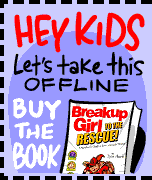

     |
| July 10, 2000 CONTINUED |
|
|||
|
Your Do Tells truly put the "team" -- though not the correct spelling -- in "esteem." See, if BG said "Join a club!" or "Find a hobby!" or "Give yourself some TLC!" she would sound like a lame unoriginal dork. But when you guys tell me that that's what you did -- and it worked -- well, there you go. Thanks to everyone who wrote. Anonymous: For the longest time, I would go through cycles where I truly needed to be with someone to feel worthy. While I was in college, I got into a turbulent relationship -- I felt the need to hold on no matter how he treated me (which wasn't too great most of the time). When I was with him, I felt such a sense of "self-worth" (albeit the superficial kind) that I never wanted to let go. It ended about a year ago, and there is one basic truth that truly helped me through it: I figured out that it's better to be alone and OK than to be with someone and unhappy. I know that often being in a relationship infuses us with a potent feeling that somehow it makes us a "good enough" person. But how can something as important and as delicate as a sense of self-worth come from someone else? Terminally Single Guy: Self-esteem is something I've had serious problems with for a loooooong time and am very slowly working my way through. I have a few tips that will hopefully help out: 1. Treat yourself right. My tendency is to be really harsh on myself. "You moron, why did you think that would work? You should know better!" When you're thinking to yourself, think like you would talk to your best friend if s/he were in a similar situation. Be supportive to yourself, but be honest. In relationships, this is especially important because it is impossible to know exactly what other people think, but it is all too easy to beat yourself up for not predicting their thoughts accurately. 2. Do What Is In YOUR Best Interest/Be "Selfish." A few weeks ago, I decided to tell a good friend I was interested in her. I knew if I didn't, then I would pine after her for a long time, and it would hurt me a lot. The time it took to tell her and work through it was difficult, and unfortunately she decided against anything beyond a friendship, but when everything was said and done, I had done what I needed to do for ME. I worried if it would have a negative impact on her, but my mental health was also at stake and I decided that was more important. Afterwards, I felt great because I had done something for me instead of worrying more about what other people thought. (We're still good friends now, by the way.) 3. Give it time. In my case, it took years to build up my lack of self-esteem. It won't appear overnight. Robin: I have learned to "act as if." Even if I don't believe that I'm worth a damn, I can sometimes summon up my courage to pretend for an hour or a day that I truly believe that I'm hot sh*t. It grows on you and gets a little easier each time. After a while, it doesn't seem like such a lie anymore. Diane: Throughout high school and college, I had MAJORLY low self-esteem. I can remember thinking how ugly I was, how untalented, etc. I also cared so much about what other people thought of me that I would try to anticipate what they wanted from me and how they wanted me to act. I can't really describe how I stopped being so self-destructive, but a lot of it has to do with my enrolling in improv classes. I found out I was good at doing something I love and that boosted my confidence. Once my confidence was boosted, I noticed that I became a lot more attractive to guys. I also made friends through doing improv -- good friends, not friends who criticized me. Now I'm still acting and doing improv, and even though there is a lot of rejection in this biz, I know I'm good, I know I'm attractive, and I know I can do what I set my mind to do. When I read my scribblings from high school and college, it makes me realize that I've really come a long way! More... |
||||
|
||||

 |
